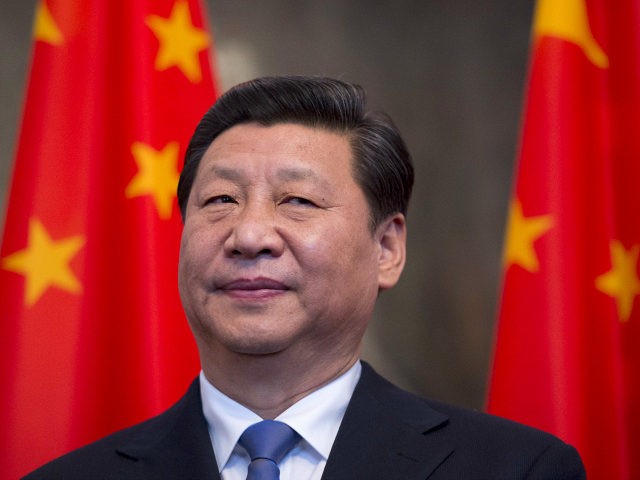Chinese Communist Party leader Xi Jinping warned attendees at the nation’s First China International Import Expo on Monday that economic globalization was “an overarching trend, something that is independent of people’s will” and that history would leave behind those sticking to policies benefitting their countries.
Xi made the remarks during his keynote speech at the event, which brought together heads of state from developing nations around the world looking to attract Chinese investment and stabilize their economies. China, in turn, offered funding for development projects that would greatly benefit China in exchange for a greater foothold in the countries in question.
The policies outlined in Xi’s speech are an extension of the global infrastructure project known as One Belt, One Road (OBOR) or the Belt and Road Initiative (BRI), which seeks to make China the builder and controller of the world’s most important ports, roads, and railways.
The state-run Global Times publication ran Xi’s full speech on Monday.
“People with vision in the world would agree that economic globalization, as an irreversible trend of history, has greatly boosted global growth,” Xi told attendees. “This is an overarching trend, something that is independent of people’s will. What we mankind can do is to understand, adapt to, and apply the law of history instead of trying to prevent it from happening. The wheel of history, indeed, will keep rolling forward no matter what.”
Xi insisted that all nations must “open wider and expand the space for mutually beneficial cooperation,” arguing that “seclusion leads to backwardsness.” He appeared to reference ongoing trade talks with the United States without mentioning America by name, arguing, “beggaring thy neighbor, isolation and seclusion will only result in trade stagnation and an unhealthy world economy.”
On the contrary, Xi argued, “efforts to reduce tariff barriers” would bring greater prosperity. “Countries need to pursue an open policy, explicitly oppose protectionism and unilateralism, and strive to enhance the level of opening-up at both multilateral and bilateral levels,” he added.
Xi repeatedly stated that globalization, while allegedly inevitable, was “under threat” of unspecified forces of “protectionism and unilateralism.” He addressed these by issuing specific proposals China will adopt to make globalization more accessible to more of the world.
The BRI was, of course, on top of this list. “China will continue to advance the Belt and Road Initiative through international cooperation in the spirit of consultation and collaboration for shared benefits,” Xi vowed. “We will work with the participating countries on major projects, set up more trade promotion platforms and encourage more well-established and capable Chinese companies to invest in countries along the routes.”
The BRI/OBOR projects have largely brought legal chaos, hardship, and, in some cases, racial animus to the countries cooperating with China. Countries like Sri Lanka and Djibouti have accepted Chinese control over ports and other BRI projects, while workers in African countries complain that a surge of imported Chinese workers have eliminated job opportunities for locals. In Kenya, workers have accused China of imposing an “apartheid” system where domestic workers are kept out of skilled labor jobs and banned from suing the same buses, cafeterias, and equipment as the Chinese immigrants.
Kenyan President Uhuru Kenyatta was among the heads of state attending the international expo despite widespread opposition to the spread of BRI in the country.
In addition to the Belt and Road projects, Xi told his audience on Monday that China also planned to implement a system to rank businesses and investors and punish any businesses that the Chinese Communist Party deemed in opposition to its interests.
“We will implement, across the board, the management system based on pre-establishment national treatment and negative list,” Xi said. “We respect international business rules and practice, and provide equal treatment to all types of businesses registered in China.”
Xi concluded comparing the Chinese economy to an ocean, telling the crowd, “Big winds and storms may upset a pond, but never an ocean. Having experienced numerous winds and storms, the ocean will still be there! It is the same for China.”
Among the world leaders leaving China with new trade deals are the president of El Salvador, the prime minister of Pakistan, and Miguel Díaz-Canel, the subordinate to Cuban dictator Raúl Castro. Xi’s ocean metaphor appeared to be an attempt to calm these and other world leaders on the steep decline in the national economy’s health in light of the imposition of tariffs on behalf of the Trump administration.
China’s Shanghai Composite Index saw its value fall to its lowest level in four years last month, and the Chinese economy generally expanded in 2018 at the slowest rate in modern history since 2009. Chinese officials blamed the “severe international situation,” likely referring to negotiations with the Trump administration, for the decline.

COMMENTS
Please let us know if you're having issues with commenting.